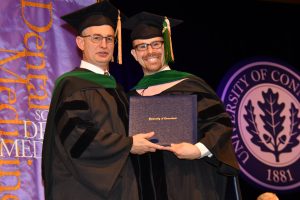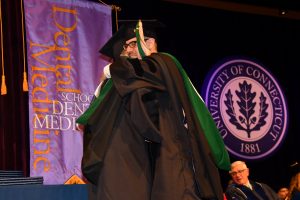
It has been three years since the student-run UConn Health Leaders program launched, and the data shows that the program is significantly making an impact to curb patient health inequities.
The program, taking place across several UConn Health outpatient care waiting rooms in five different towns, is powered by volunteering UConn medical students and undergraduates.
While the students initially conducted screenings virtually by phone during the pandemic’s start, since June 2021 they began confidentially surveying patients on iPads in-person while patients awaited their appointments. The students were able to uncover social determinants of health in real-time that put the patients at elevated health risks or for health care inequities and then intervene to help. If the patient screened positive for a social determinant of health, the student advocates connected the patient with the necessary social resources.
Eighty percent of an individual’s health outcomes are actually influenced by one’s social determinants of health, which are a person’s day-to-day environmental factors that may influence health, outcomes, and quality of life, such as food insecurity, housing, and transportation.
New Class of 2023 graduate of UConn School of Medicine Dr. Henry Siccardi just earned his dual medical degree and Master of Public Health. He co-founded UConn Health Leaders back in 2020 with medical school classmate Dr. Jacqueline Steele, a Class of 2022 alumna, along with two initial members of their leadership team, Erin Cova and Zoha Sarwat, who are current UConn medical students. The program was started after Siccardi realized they could help underserved patients more by just utilizing the time spent in the waiting room.
After more than 15,000 volunteer hours for the program, Siccardi loves this work so much that he has chosen to remain at UConn School of Medicine to help grow the program and pursue his internal medicine residency training.
“I am really proud of our UConn Health Leaders program’s success,” says Siccardi. “I love UConn. I love medicine and the practice of medicine, and the ability to help sick people and to help prevent healthy people from getting sick.”
The UCHL program so far has trained more than 300 volunteering students to conduct the waiting room screenings. The volunteer students are taught what health disparities may exist, how to identify them, and also most importantly how to help fix them.
“We have been successful at impacting the health and lives of the patients we meet in a positive way,” says Siccardi, who was recently appointed co-chair of UConn Health’s Patient and Family Advisory Council.
“Our UConn Health Leaders program is also building up the experience of future practitioners who someday will enter the health care field,” says Siccardi. “Our screening program has been really eye-opening for our volunteer students. If we can grow our health care workforce’s awareness and ability to identify health disparities, we really can make our world a better place and strike out health inequities.”
But Siccardi has a call to action for the wider community.
“We are really good at identifying social determinant of health problems, but we need to do a better job as a society to prevent them and problem solve for these ongoing issues impacting our people,” he says.
His UConn Health Leaders program faculty advisor Dr. Christopher Steele couldn’t agree more.
“Three years later, this has developed into a successful program that invests in the health and wellbeing of our community. On the ground programs like this are not only helping our community for the better, but it’s creating students that are excited to make an impact,” says Steele, assistant professor of medicine at UConn School of Medicine and UME/GME Educational Liaison.
Steele adds: “This intervention program is really unique and isn’t done anywhere else. Our student volunteers are trained to pick up the phone and connect someone they identified with an unmet social need to a community organization that can help.”

“Us UConn students are building bridges that have never been built before to get patients the services they need,” stresses Siccardi. “We are working hard to attempt to get more and more people across the water. But there is a lot more work to be done. We need to build more bridges and want to connect patients with all the possible community outreach organizations who can help.”
Since 2020 the program’s three-year data of social determinant screening shows that more than 19,000 patients were approached and asked to be screened and nearly 9,000 consented with 90 percent of patients when approached in-person choosing to fully complete the screening.
Of those, more than a majority of 5,945 patients or 66.1 percent screened positive for a social determinant of health issue. UConn students were able to attempt to connect 2,115 of these patients in need to community resources. The program data found 69 percent of people who needed help wanted to hear about community resources, 49.2 percent wanted help at the visit, and ultimately 49.2 percent accepted the resource once they heard about it.
The top 5 most common barriers experienced by patients that UConn students identified between 2020-2023 included:
| Rank | Disparity | Total Patients Identified
N=8,895 |
Percent Patients Identified |
| 1 | Smoking cessation | 2,824 | 31.4% |
| 2 | Unemployed Looking for Work | 1,356 | 15.1% |
| 3 | Homeless or Risk of Losing Housing | 877 | 9.8% |
| 4 | Transportation Issues to and From Visits | 816 | 9.1% |
| 5 | Less Than High School Education | 732 | 8.1% |
In addition to Steele’s guidance, the UConn Health Leaders program credits its successful program to the additional support of Khadija Poitras-Rhea and the UConn Health Department of Population Health team.
Connect with the UConn Health Leaders program.



